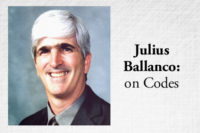In this fast world of communications, it was reported almost instantly that the appeal of the National Association of Home Builders (NAHB) was denied by the International Code Council (ICC). Many asked, “What appeal?”
Having a front row seat through the entire process was extremely interesting. I should start from the beginning. After the vote at the ICC Code Hearings in Minnesota last September to approve the mandate of residential sprinklers for one- and two- family dwellings and townhouses, NAHB filed an appeal. The ICC appeal process allows anyone to challenge the process and procedures of a code change hearing. The interesting aspect is that the technical merits of a code change cannot be a part of any appeal.
NAHB cried foul regarding what they perceived as stacking the vote. They claimed that a single interest group, namely the fire service, stacked the room. Furthermore, they claimed that the International Residential Code (IRC) Fire Sprinkler Coalition paid the travel costs for many of these individuals to attend the code hearing. NAHB asserted that the process should be fair and balanced. They were of the opinion that a consensus had not been achieved.
Individuals were permitted to submit written comments prior to the appeal hearing in December. Many home builder organizations wrote letters supporting NAHB. Other letters of support came from the American Institute of Architects (AIA) and Building Owners and Managers Association (BOMA).
Letters in opposition were received from many groups, as well. One such letter was from the American Society of Professional Engineers (ASPE), proponent of the proposed change to mandate residential sprinklers. The ASPE letter can be read on the ASPE Web site,www.aspe.org, under “Leadership Communication.”
No Exact Procedures
Three ICC members were appointed as voting members of the Appeal Board. The fourth member (non-voting) was ICC Vice President Ron Lynn, who also chaired the Board and the hearing. Since there are no exact procedures in place, Lynn had to call the shots on the day of the hearing.The initial presentation by NAHB was granted a 20-minute time limit. Ed Sutton, P.E., NAHB Senior Staff Vice President, presented NAHB’s position. Sutton is a highly respected engineer who made a very professional presentation. He admitted that NAHB funded inspectors to the hearings in the past, as well as to Minnesota. However, he thought the process needs to change. Sutton emphasized that the fire service representatives far outnumbered the other inspectors in the room during the code change hearing on residential sprinklers. He provided the tracking numbers of votes before and after this particular code change.
One of the more compelling arguments was that jurisdictions had multiple representatives that threw off the concept of votes assigned by population. Many examples were given whereby a jurisdiction of a given population had members from the building department, the fire department, and the fire inspection department. Part of the challenge included questioning whether volunteer fire departments should be allowed to join as voting ICC members since they put out fires rather than inspect them.
A number of other speakers followed Sutton’s presentation, including the general counsel for NAHB. All had the similar theme: The ICC system was broke, you cannot have stacked meetings, you cannot have groups paying for inspectors to attend (even though this has been done by NAHB), and the voting was tainted.
After all of the supporters had a chance to speak, those opposed to the appeal were granted the same opportunity. Jeff Shapiro, P.E., Executive Director of the IRC Fire Sprinkler Coalition, was granted 20 minutes as the initial speaker. Shapiro eloquently countered every comment presented by NAHB. He stated that the IRC Fire Sprinkler Coalition was forced to provide travel subsidies because NAHB has been funding favorable inspectors for their causes for years. Shapiro indicated that this became a reality after losing the initial vote to mandate sprinklers by less than 100 votes in Rochester, NY, the previous year. NAHB had funded enough inspectors to prevent the code change from receiving the two-thirds vote required.
Shapiro pointed out that there was no violation of the rules regarding funding of inspectors. He also indicated that, before the Coalition funded any votes, they received a legal opinion regarding the ethics behind such support. The Coalition followed the ethical process identified by the attorney. Shapiro also stated that he knew that the Coalition provided travel for some inspectors that voted against the code change to mandate residential sprinklers.
Shapiro was emphatic that not one ICC policy or procedure was violated during the code change hearing, or leading up to the hearing
Strong Support For Sprinklers
Many speakers got up and opposed the appeal. ASPE’s position was presented by Stan Wolfson, executive director. Wolfson said the issue was that NAHB could not claim that only the fire service supported the change. Rather, the plumbing engineering community was a proponent of the code change and encouraged all segments of the industry to support it.After all speakers made initial presentations, there was an opportunity for rebuttal. Once discussion concluded, the Appeal Board met behind closed doors to review the appeal. After a couple of hours, the Board reconvened the meeting to announce their decision. They voted unanimously to reject the appeal. However, they indicated that they would recommend to ICC to review the procedures regarding funding of inspectors.
The following week, the Appeal Board recommendation was presented to the ICC Board of Directors at their meeting in Las Vegas. The ICC Board of Directors voted unanimously to accept the recommendation, thus rejecting the appeal by NAHB.
If NAHB decides to file a legal challenge in the courts to the mandate of residential sprinklers, they can only do so if they have exhausted all administrative remedies. The appeal is part of the administrative process. Hence, NAHB is now free to file a legal challenge in the courts.
They have not indicated that they would do so. Let’s hope that they do not.

